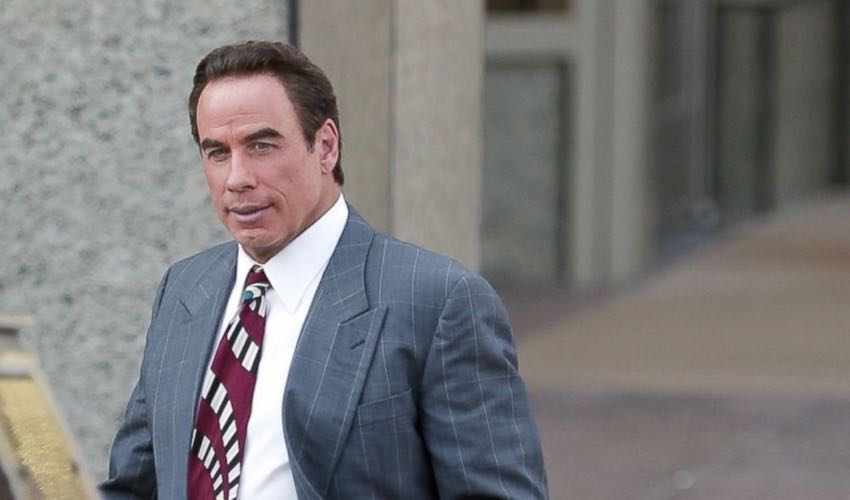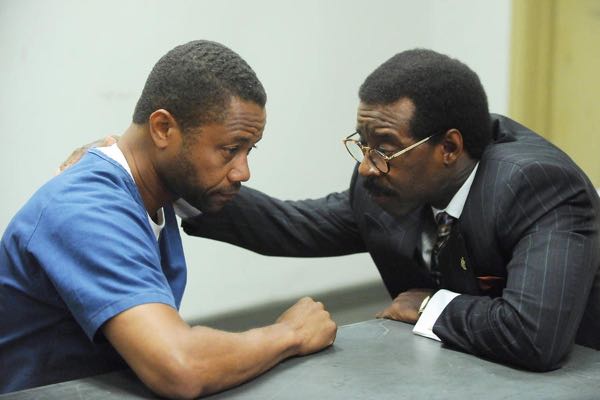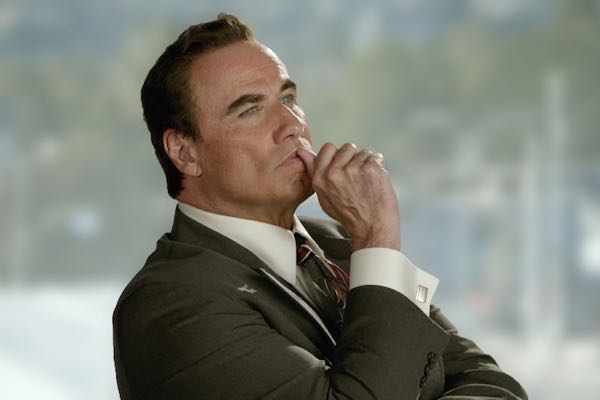John Travolta Talks 'The People Vs. OJ Simpson' and Whether Playing Role Changed His Views on Infamous Case
- Details
- Category: Interviews
- Published: Wednesday, 17 February 2016 08:51
- Written by Fred Topel

John Travolta returns to television for the first time since Welcome Back, Kotter. Only this isn’t a comedy, but it may be even more ridiculous than Kotter. The People Vs. O.J. Simpson: American Crime Story stars Travolta as Robert Shapiro, attorney to the infamous celebrity murder suspect.
Since it premiered on February 2, The People Vs. O.J. Simpson has captivated viewers all over again with the inside story of the Simpson trial, and they haven’t even gotten to court yet. Cuba Gooding Jr. plays Simpson, with Sarah Paulson as prosecutor Marcia Clarke and Courtney B. Vance as the charismatic Johnny Cochran. We spoke with Travolta about his role on the show after his press conference for the Television Critics Association. The People Vs. O.J. Simpson airs Tuesday nights at 10PM on FX.
It’s such an extreme production, did any of it come out differently than you expected?
Actually, better. I knew that we were set up for potential excellence. Everybody was on their A game and I just at one point said, “You know what? These guys know exactly what they’re doing and I’m just going to do my part.”
Had you encountered Robert Shapiro at any point in your time in Hollywood?
No, you would think I would have. I have a different legal team, even though you would have thought I would run into him. I knew a lot of people who knew him and that helped, because I could ask questions. But he did write a letter to me at one point, very thrilled that I was going to portray him. I hope he still will be, I don’t know.
What fascinated you about Robert Shapiro?
I think his ego I knew I could grasp. I’d been around enough of his type of man in the legal world and in the show business world, producers, studio heads, that there was enough of the kind of person I understood. I felt like I could get an angle on him that would work.
Is there a a particular scene or sequence that you’re really looking forward to seeing on screen?
Yes, there’s one in episode seven where I actually blackmail Kardashian, which was the most despicable moment I’ve ever had in my career of acting. I can’t believe that the character actually leverages him to try to settle, to convince the team to settle. It was such a strange day to play that and I want to see how that came out. There’s a lot of moments I am looking forward to.
What about the scene with F. Lee Bailey?
I’m looking forward to the F. Lee Bailey scene. I’m looking forward to the fun aspects of watching Robert Shapiro, some of the humorous [moments]. He’s sitting in front and says, “You know who the victim is here? Me!” Those are kind of enjoyable moments so it balances the starkness, if you will.
Do you remember where you were when the Bronco chase happened?
Yes, we had just won the Palme d’Or at the Cannes Film Festival for Pulp Fiction. My dad was on the chair in the living room in Carmel, Monterey. We were living up in Northern California. He said, “Johnny, you’re not going to believe this.” There I was, pulled right into this scenario.
Had you ever met O.J.?
No. You would have thought I would have.
How do you look back on that career renaissance after Pulp Fiction?
Well, I think it was at a point where I felt I had done well in my career but I never imagined that one project could give me that kind of second career where I was offered the A scripts again and the Oscar contender type scripts. There weren’t many examples of that in the history of cinema so I was very honored and privileged that I had that little niche.
Has Quentin ever had anything else for you?
No. In the day, he gave me a choice between Dusk TIll Dawn and Pulp. I said I’m not really into vampires, so I like the other one.
Do you think People Vs. O.J. could be that kind of game changing role again?
Well, TV is definitely prestigious and it’s 10 hours of a character, not two. Those elements could balance out to be a game changer in a lot of ways. All an actor wants is the best opportunities to play the best roles. That’s really what they’re looking for, nothing else.
Have you found there’s more attention on this show than even the biggest movies you’ve done, because of the subject and the breadth of television?
Yes. Because it’s been a positive reaction to the quality of the communication, I’ve been pleased with everyone I’ve spoken with about it. It’s been a pleasure because it’s an agreeable subject, meaning that there are so many that are pleased with the result of it that it’s easier to experience the big reaction it’s getting.
Would you want to do more television if it’s a limited series like this?
Yes, limited series. I don’t know if I could do it full time, and I also enjoy doing movies so I wouldn’t want to eliminate my time for that.
How was it different playing Shapiro versus something like Primary Colors, where it was based on Bill Clinton but not entirely Bill Clinton?
It’s a similar approach because I felt like it was a very thinly veiled interpretation of Clinton that Mike Nichols wanted us not to admit we were playing. I said, “Mike, I look like him, I’m speaking like him, walking like him, behaving like him. We’re taking the direct dialogue from his speeches. I’m playing him, man, so let me play him.” I had a very similar approach building the character from physical attributes and vocal attributes and really enjoying that process, which is my favorite thing to do.
Do you feel the pressure of playing a real life person?
I do but from my own personal viewpoint. This is how I honestly feel. If I get it right enough, I can invite you into a true story because there are a good majority of people that will be so familiar with the case and the character, that unless I convince you, just like with Primary Colors, that I am that person, you won’t be as easily invited. So you have to do just enough to say, “Look, this is the game we’re playing. We’re playing this scenario, and come along. Go for this ride.”
How did you make Shapiro’s physicality work for your performance without doing a campy impression of him?
All you had to do is watch the videos of him. I was doing only what I observed him to do. I didn’t do any more than he was. It was delicious to watch. I’m good at taking on characteristics of people physically, whether it’s from dance or just all the years of being an actor, but that’s where I kind of excel. So watching him was like wow, this will be something to do to make this authentic. But I wasn’t really doing anything different than you an find on the videos. The writing led you to egocentric moments that were fun.

Were you surprised or shocked by the theatrics of the O.J. trial?
I was more surprised by the theatrics behind the scenes than the actual trial. We were amazed. Every knew episodes, we couldn’t believe it. When those Mark Fuhrman tapes came up, which you’re going to get to, we couldn’t believe what we were reading. Every week we couldn’t believe what we were reading.
Is it like discovering things that have been around for decades?
Exactly, and not allowable into court. When the case was over and put away, this is the first time it’s been brought out, things that are allowed to now be talked about.
Do you feel differently about the trial now than you did in ’94-’95?
No, just more informed. I just feel like I completely understand. This is almost to the point of, you know when someone gives an Oscar to someone for a performance they did [before]. Rodney King should’ve maybe had this wind, or other unfair situations. This was the one that was almost a catch-all for earlier things that should’ve been handled differently.
